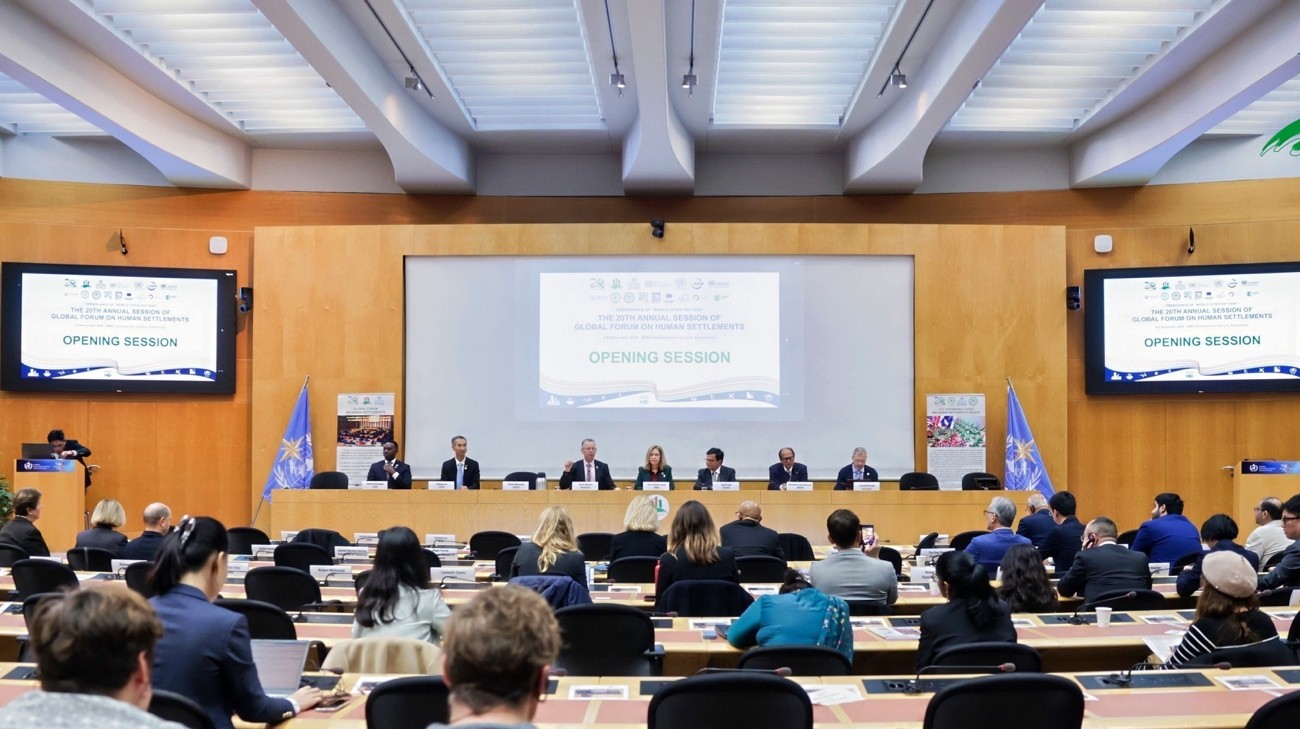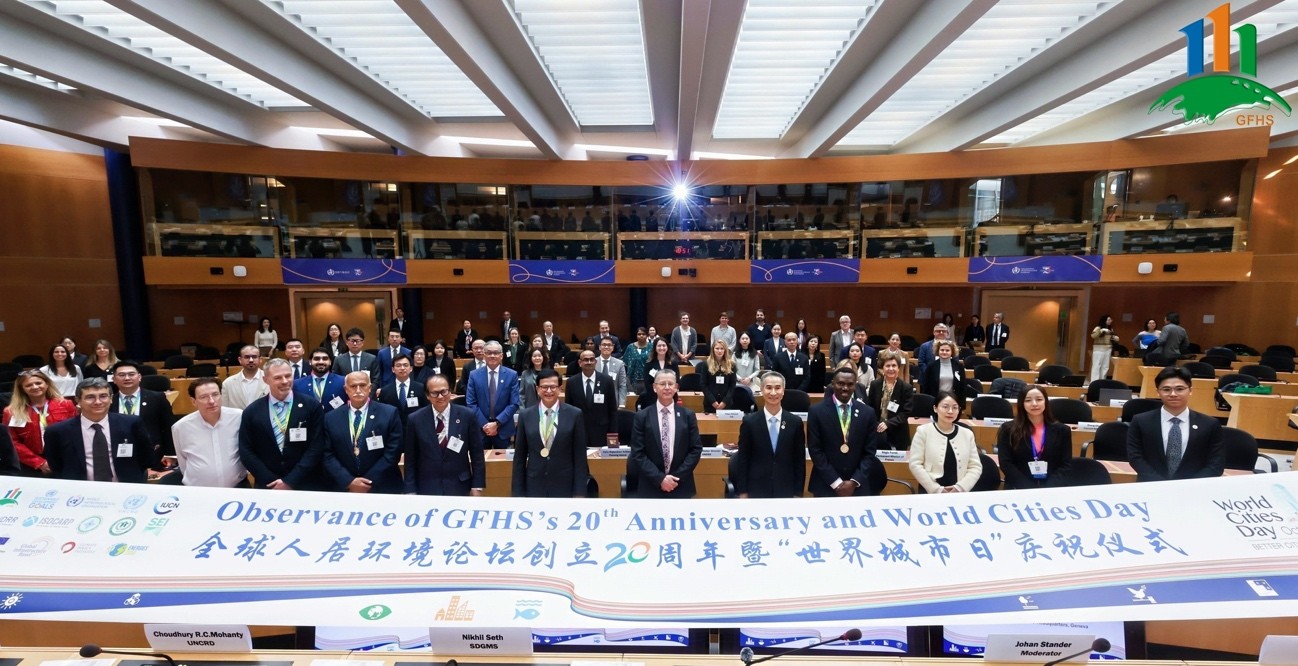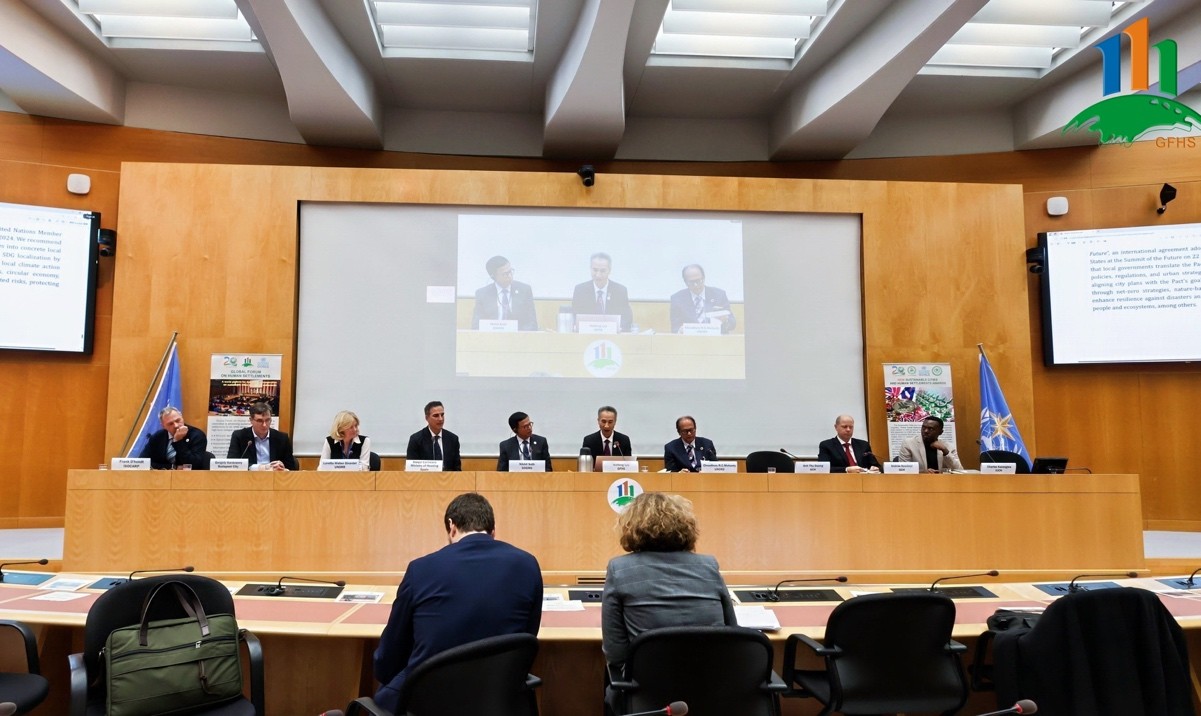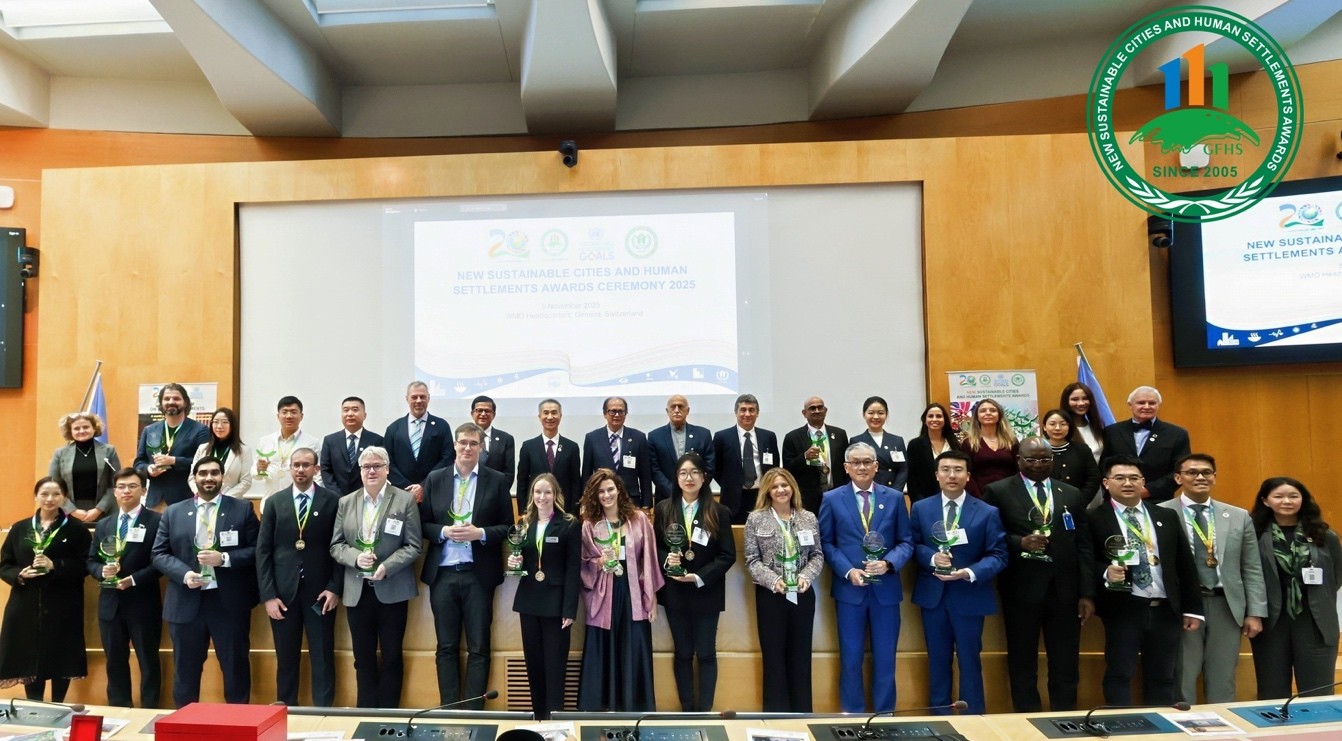


Committed to Sustainable Cities and Human Settlements for All

In Special Consultative Status with ECOSOC

(Geneva, November 5) With persistent efforts and unwavering determination, the Global Forum on Human Settlements (GFHS) celebrated its 20th anniversary this year. The centerpiece of GFHS’s 20th-anniversary celebration—the 20th Annual Session of Global Forum on Human Settlements and the prestigious New Sustainable Cities and Human Settlements Awards (SCAHSA) Ceremony were successfully held on November 4–5 at the headquarters of the World Meteorological Organization (WMO) in Geneva, themed as “Advancing Local Innovation and Cooperation for a Resilient and Sustainable Urban Future”. It also served as an observance of “World Cities Day 2025”.

Opening Session, GFHS 2025
Ambassador Anwarul K. Chowdhury, Chairman of Global Forum on Human Settlements (GFHS) and former UN Under-Secretary-General and High Representative, Professor Celeste Saulo, Secretary-General of the World Meteorological Organization, and Dmitry Mariyasin, Deputy Executive Secretary of the United Nations Economic Commission for Europe (UNECE), addressed the conference. The landmark Geneva Declaration was released, providing a consensus-based reference for urban transformation and development worldwide. 19 best practices demonstrating outstanding achievements in sustainable cities and climate action were recognized, offering replicable and scalable models for more regions and sectors.
As one of the world’s most important conferences focusing on sustainable cities and human settlements, this year’s annual session was jointly organized by 22 authoritative institutions. The forum brought together more than 300 participants from over 40 countries, including senior government officials, diplomats, high-level representatives from the United Nations and other international organizations, business leaders, renowned experts and scholars, industry innovators, and NGO representatives. This marked the second time in 12 years that the GFHS Annual Session was held in Europe.
Heads of international organizations delivered speeches at the forum, including Nikhil Seth, Rector, SDG Management School, former UN Assistant Secretary-General, Dr. Awni Behnam, Hon. President of International Ocean Institute, Choudhury Rudra Charan Mohanty, Environment Programme Coordinator, United Nations Centre for Regional Development (UNCRD)- DSDG/UN DESA and Frank D’hondt, Secretary General, International Society of City and Regional Planners (ISOCARP), among others. Urban leaders from Budapest, Hungary; Penang Island, Malaysia; Oeiras, Portugal; Dubai, UAE; Freetown, Sierra Leone; as well as Beijing, Tianjin, Chongqing, and Suzhou in China shared successful experiences and insights on urban innovation and sustainable development. Industry innovators from multiple countries presented their exemplary projects and advanced technologies. Experts and participants engaged in in-depth discussions on the theme and various critical topics, proposing scientific policy recommendations and solutions.
Meanwhile, the organizers facilitated closed-door meetings, on-site exhibitions, and networking receptions to actively create opportunities for participating cities and enterprises to exchange ideas and promote their initiatives, expand international networks, and foster international economic, trade, and cultural cooperation. These efforts aim to leverage innovation and collaboration to advance sustainable urban development and climate action.

Observance of GFHS’s 20th Anniversary and World Cities Day 2025
GFHS Chairman Ambassador Anwarul K. Chowdhury stressed that for two decades, GFHS has remained steadfast in its mission to promote sustainable cities and human settlements for all, guided by the conviction that urban transformation must be people-centred, inclusive, and equitable. We celebrate not just the passage of time, but the perseverance and shared purpose that have carried us forward.
Professor Celeste Saulo, Secretary-General of the World Meteorological Organization, pointed out that as we mark this 20th anniversary of the Global Forum on Human Settlements, let’s use today’s discussion to inspire, to collaborate, and to act. Let’s work together to bring the best of science, data, and community expertise to build cities that are sustainable, safe, inclusive, and climate-ready - where every forecast, every drop of water, and every degree of temperature matters for the well-being of all.
Dmitry Mariyasin, Deputy Executive Secretary of the United Nations Economic Commission for Europe, emphasized that multilateralism increasingly recognizes cities as indispensable partners in shaping sustainable and resilient societies. Advancing equitable, resilient, and thriving human settlements is our collective duty. Empowering cities with the right tools, partnerships, and data will transform urban futures—ensuring that no one is left behind. The Global Forum on Human Settlements offers a unique opportunity to shape the cities of tomorrow. Through leadership, innovation, and cooperation, we can build urban environments that are not only sustainable but also just and resilient.
Nikhil Seth, Rector, SDG Management School (SDGMS), former UN Assistant Secretary-General indicted that local innovation is the bridge between global aspiration and daily life — the human face of the SDGs. Innovation thrives in collaboration. This Forum’s deliberations link directly to the UN Pact for the Future, calling for networked and inclusive multilateralism. Let GFHS evolve into a Global Urban Innovation Partnership — linking good practice, data, and finance. The UN at eighty must listen not only to capitals but to communities — for there lies the future of multilateralism.
The Geneva Declaration synthesizes the perspectives and insights of 22 authoritative institutions, numerous local governments, and conference participants, drawing on exemplary practices from leading cities and the profound expertise of distinguished figures. It is grounded in the 2030 Agenda for Sustainable Development, the New Urban Agenda, the Pact for the Future, and the outcome documents from previous GFHS annual sessions. Addressing both current challenges and future opportunities, the Declaration issues a powerful call to the international community across five key areas: urban governance and innovation, enhancing environmental sustainability and resilience, building green, smart and carbon-neutral cities, fostering inclusive growth, and deepening international cooperation. It provides systematic and actionable recommendations for building a resilient and sustainable urban future while strengthening the voice of local governments and urban stakeholders at the upcoming COP30.

Geneva Declaration is released at the closing session
The Declaration points out that we collectively face a world of multiple challenges and uncertainties. Today, as the new technological revolution continues to gain momentum, cities stand at the epicenter of a storm of innovation. Future-proof urban development is characterized by trends such as decoupling, decarbonization, decentralization, digitalization, polarization, and metropolitanization, presenting both opportunities and challenges.
The Declaration states that while global temperatures repeatedly break records, many countries cool on climate action. The rise of unilateralism has led to an imbalance in the international order, resulting in widespread chaos. Cities bear global responsibilities. Forward-thinking local governments and urban leaders can exercise critical leadership by leveraging the power of innovation to drive sustainable development, resolutely implementing carbon neutrality plans, and strengthening "city diplomacy" to uphold a multilateral international order. By catalyzing large-scale local innovation and proactive action, cities can accelerate their transformation and thrive amid uncertainties, ensuring a more livable, adaptable, inclusive, resilient, and sustainable urban future for all.
As a highlight of GFHS 2025, the New Sustainable Cities and Human Settlements Awards Ceremony was grandly held. Positioned as a globally authoritative accolade for a sustainable urban future, New Sustainable Cities and Human Settlements Awards (New SCAHSA) aims to recognize and honor outstanding innovation and leadership in making sustainable cities and human settlements, and advancing climate actions, and promote their innovative strategies, technologies and approaches as well as successful experience.
This year's awards achieved record highs in both application quality and laureate influence. Compared with the past five years, there was a notable increase in applications and award recipients from cities and local governments. All four Chinese municipalities directly under the Central Government as well as innovative economic powerhouses like Shenzhen and Suzhou submitted flagship projects for the competition.
Reportedly, GFHS Secretariat received over 400 applications this year. After rigorous evaluation by the Jury, 36 finalists spanning 10 categories were selected, with 19 ultimately receiving the top honors. Winners were presented with green crystal trophies and cash prize, celebrating together in embraces. Senior officials from the United Nations and other international organizations attended the ceremony to present the awards and congratulate the awardees. The audience, brimming with enthusiasm, chanted "SCAHSA!" in rhythm with the host—cheering for the stars of sustainability and championing green initiatives. The sounds of eco-advocacy resonated across Lake Geneva, while the spirit of sustainability spread worldwide like a sweeping breeze.

New Sustainable Cities and Human Settlements Awards Ceremony 2025
Distinguished award recipients include Chaoyang District, Beijing, China; Sino-Singapore Tianjin Eco-City; Budapest, Hungary; Penang Island, Malaysia; Innovative Practices in Low-Carbon Development and Urban Regeneration at the Shanghai World Expo Park; Suzhou High-Speed Rail New Town Urban and Rural Construction Carbon Peaking and Carbon Neutrality Pilot Zone; Wonderwoods Vertical Forest, the Netherlands; Zambezi and Victoria Falls National Park, Zimbabwe; Tommy Thompson Park, Canada; AMP ONE Municipal Solid Waste Processing System, United States, among others.
Copyright © Global Forum on Human Settlements (GFHS)
